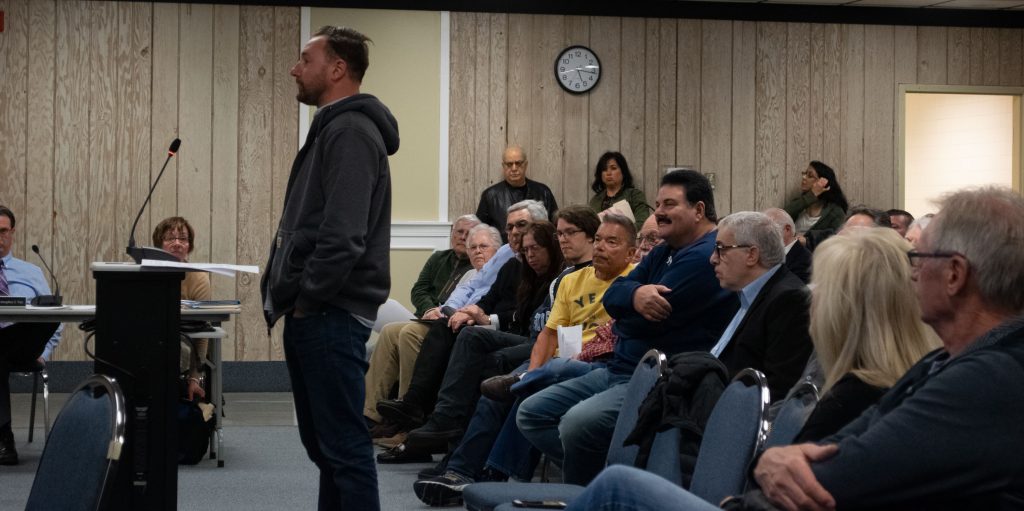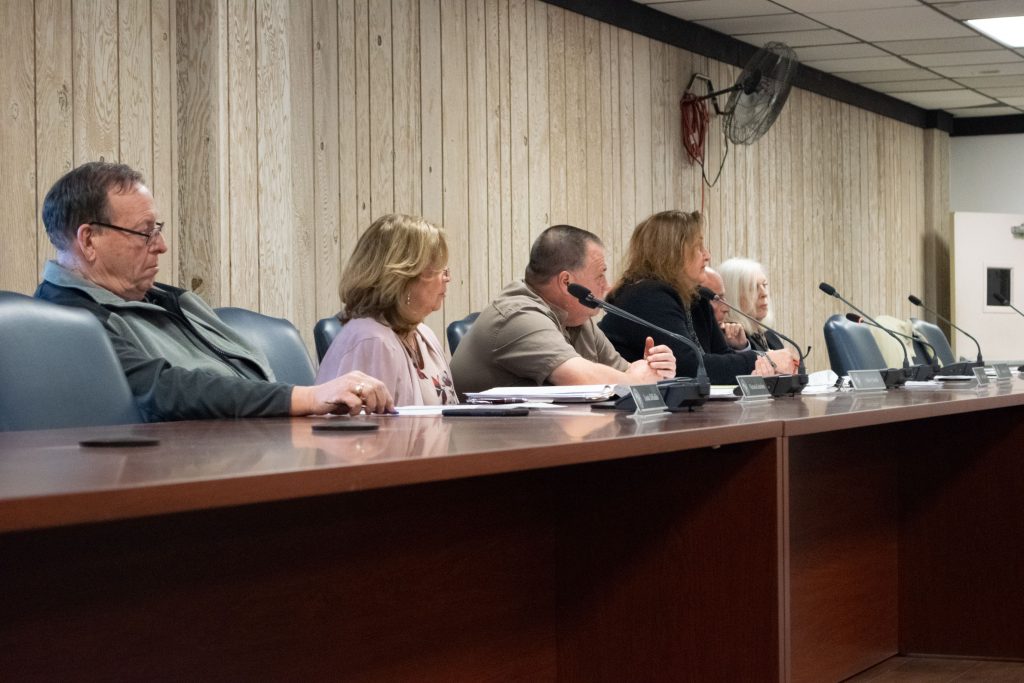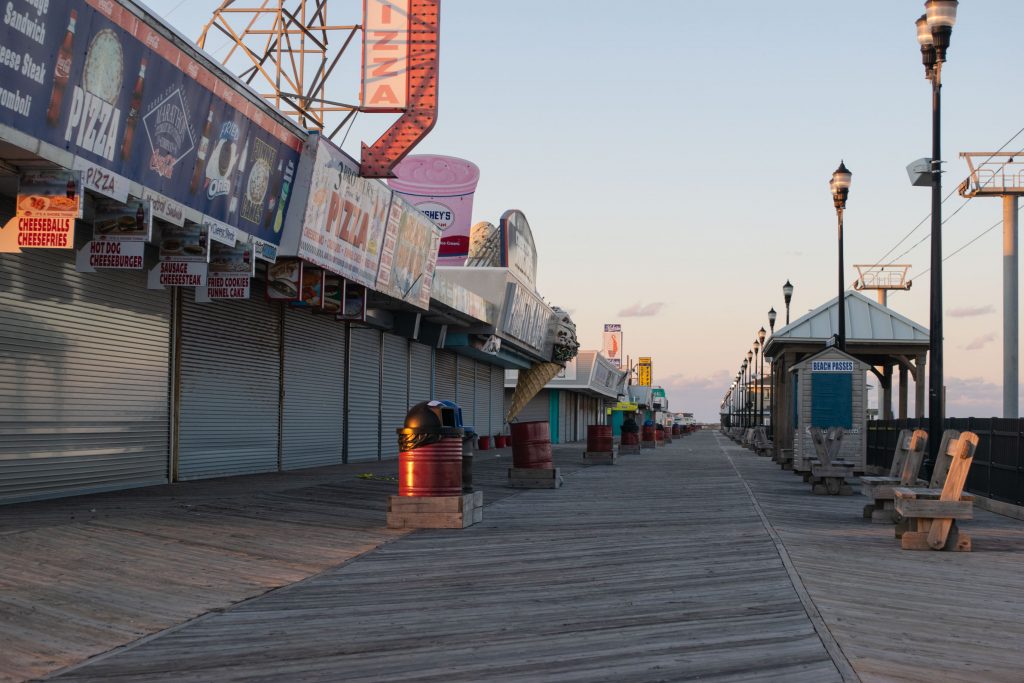
Discussion of a zonign ordinance at the March 4, 2019 Seaside Heights council meeting. (Photo: Daniel Nee)
The Seaside Heights borough council on Wednesday night took what officials are calling the latest step in the town’s transformation from the hard-partying nightclub mecca seen as MTV’s Jersey Shore to a family-oriented resort. But the governing body’s decision to limit the size bars and other entertainment establishments on the northern end of the boardwalk did have some objectors.
The ordinance, which was passed unanimously on final reading (with two abstentions), limits boardwalk restaurants and bars north of Sheridan Avenue to 5,000 square feet or less. It also allows no more than 15 seats at a bar area, requires the focus of an establishment to be dining and does not allow entertainment or rooftop parties. The aim of the ordinance is to prevent restaurant owners from converting their establishments to nightclubs after dinner hour, as is commonplace at some others in town.
“We’re starting to evolve into this family atmosphere, and I like the progression,” said resident Richard Kearney. “That’s why we’re living on the north end.”
The new zone allows restaurants to operate between 7 a.m. and midnight, but only allows a single bar.
The ordinance faced opposition primarily from business owners who either own liquor licenses or plan to buy them in order to open up future bars. Numerous objectors addressed the council, though many were connected to the same underlying businesses. Some, however, argued that limiting the size or types of businesses allowed on the northern portion of the boardwalk would be an overall detriment to the town. The ordinance also prohibits rides and other entertainment venues.
“My home is here, my business is here and I raised my children here,” said Patty Hershey, who owns properties in the affected area. “With the stroke of a pen, my properties are going to be devalued. We have one boardwalk – why are we separating the boardwalk?”
Stephen Sinisi, an attorney representing a boardwalk business owner, argued that the ordinance would also keep out establishments that would normally be considered family friendly, like escape rooms or similar attractions. Sinisi did concede, however, that his client is “contemplating a restaurant that would serve alcoholic beverages.”
“Just because there’s alcohol does not mean a business is not family friendly,” Hershey added. “It’s about how the business is operated.”

Discussion of a zonign ordinance at the March 4, 2019 Seaside Heights council meeting. (Photo: Daniel Nee)
The northern end of the boardwalk has seen an uptick in residential construction in recent years. It is also where Seaside Heights is planning to build a museum that will serve as a home for its historic Dentzel-Looff Carousel, which was specifically permitted by the ordinance. Residents in the area said they appreciated the quieter scene of their neighborhood and have noticed improvements since the town began to shake off its rowdy reputation.
“Mayor Vaz has brought us forward a long distance from where we were,” said Pete Carlino, of Sampson Avenue. “Sometimes, a few interests have to suffer.”
In the past, he said, “We had people hanging around, relieving themselves all over, doing all kinds of things under the boardwalk. What we need is to come forward and show that we’re not the place of MTV that gave us such notoriety, showing us as idiots.”
Jeff Jackson, owner of Jimbo’s and Marathon Steaks, expressed concern that the ordinance could limit where he could do business in town if he ever wanted to relocate or expand.
“I don’t think anyone has ever said we are a nuisance or a problem, but I wouldn’t be able to build this business on the north end of town,” said Jackson, specifically bringing up the fact that it could be difficult for a restaurant to maintain customers with a 15-seat bar that can only serve to those who are already seated.
“If what you’re trying to do is to curtail loud nightclubs from being there, perhaps design the entire ordinance to do that,” he suggested.
Since the ordinance passed, the new zone (titled Recreational Resort Zone ‘B’) has been created and new businesses must adhere to its restrictions. But, as with all zones, businesses may apply for a variance that would allow them to exceed limitations, or to operate establishments with specific conditions – such as the lack of a nightclub environment.
While some asked the council to table the ordinance so more debate could be heard, officials said the new zone was first proposed last summer and was withdrawn specifically so more input from residents and business owners could be sought.
“There were conversations with some of the members of the public and businesses, including a set-up with the Business Improvement District,” said Borough Attorney Jean L. Cipriani. “There has been substantial time.”

Advertisement

Ortley Beach & North Beaches
Popular Island Donut Shop Aims to Nearly Double in Size

Seaside Heights & Seaside Park
Building Boom: Slew of New Subdivisions Proposed in Seaside Heights for 2025

Police, Fire & Courts
Ocean County Sheriff Establishes Drone Command Center in Seaside Heights Amid New Video









